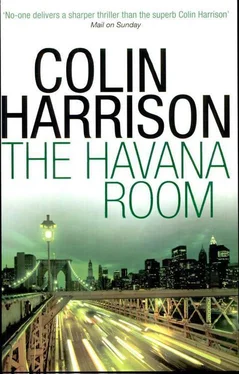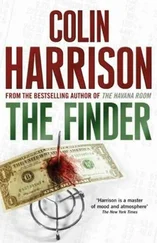Colin Harrison - The Havana Room
Здесь есть возможность читать онлайн «Colin Harrison - The Havana Room» весь текст электронной книги совершенно бесплатно (целиком полную версию без сокращений). В некоторых случаях можно слушать аудио, скачать через торрент в формате fb2 и присутствует краткое содержание. Жанр: Триллер, на английском языке. Описание произведения, (предисловие) а так же отзывы посетителей доступны на портале библиотеки ЛибКат.
- Название:The Havana Room
- Автор:
- Жанр:
- Год:неизвестен
- ISBN:нет данных
- Рейтинг книги:5 / 5. Голосов: 1
-
Избранное:Добавить в избранное
- Отзывы:
-
Ваша оценка:
- 100
- 1
- 2
- 3
- 4
- 5
The Havana Room: краткое содержание, описание и аннотация
Предлагаем к чтению аннотацию, описание, краткое содержание или предисловие (зависит от того, что написал сам автор книги «The Havana Room»). Если вы не нашли необходимую информацию о книге — напишите в комментариях, мы постараемся отыскать её.
The Havana Room — читать онлайн бесплатно полную книгу (весь текст) целиком
Ниже представлен текст книги, разбитый по страницам. Система сохранения места последней прочитанной страницы, позволяет с удобством читать онлайн бесплатно книгу «The Havana Room», без необходимости каждый раз заново искать на чём Вы остановились. Поставьте закладку, и сможете в любой момент перейти на страницу, на которой закончили чтение.
Интервал:
Закладка:
Yes, people find it difficult. They don't want you around their own children. They don't want the taint, the stain. The best of them smile blankly and find scheduling conflicts. The worst of them sport a certain anthropological curiosity and examine you for proof of remorse- teeth-gnashing perhaps, a sudden onset of Tourette's syndrome, the eating of glass, a burning tire placed around one's own neck, maybe. But if you are trying to live anything close to a normal day, if you still have responsibilities for such things as buying apples and paying your electric bill and kissing your own boy good night ("Everything's going to be fine, pal, I promise…"), then you are scraping by, dealing as best you can. And they, those scrutinizing the tightness of your tie knot, don't like what they see. They see you sigh and say, "We're just going to have to get through this." They don't like that because it's confusing. It's unpunished. They want to know if there are "legal ramifications." So what if it was an accident, a stray fingernail clipping of God falling in the wrong place? This is America. If you don't get convicted, you do get sued. O. J. Simpson escaped prison- even though he cut off his wife's headbut was successfully sued. They want to know how it's "affecting the marriage." How do you think? I wanted to scream, but didn't. We're dying.
Judith fell away from me almost instantly. She stopped having sex with me, and my idiotic banter about water skis and basketball disappeared like so much else. There was one night a month or so afterward when I felt her turn in her sleep and hold me from behind, like she used to do, her hands wrapped around my chest, and even as I felt a deep balm go through me she stiffened with a sudden inhalation of breath, pulled her hands back to herself, and turned the other way.
I could stand the loss of Judith, perhaps, but I could not stand the loss of my son. He didn't understand why people said bad things about his father. I explained what had happened, but the kids at school called him names, said his dad killed children. Said he was going to the electric chair. "It's not true," Timothy said hotly, repeating the conversation. "It's not true." But his eyes searched mine for some explanation as to how everything would go back to the way it had been before- Please, Daddy, his eyes begged, make it better — and when I couldn't do that, then his faith was diminished. The idea of dad, of father, shrank and curled inside him. He hated me, I knew, for I had destroyed his universe.
Yes, everyone finds it difficult. The school required counseling for Timothy and for us and suggested we seek "an alternative placement." We had to pull him out of the school, because of the tension, and again and again he asked why his friends didn't have him over for play dates anymore. The other families in the apartment house seemed less interested in taking him out to the park with their kids, as if a blond eight-year-old boy might somehow be a menace, might conduct lightning on a clear day. This was unfair, but expectable. We're still superstitious, all of us. Monkey-men clutching magic feathers and sniffing the wind. The secretaries in my firm, usually cackling and amicably rude, spoke to me with formality, especially after the firm kept me out of its biggest deal of the year, a $400 million office building finance-and-rent-back in midtown Manhattan. I lost eye contact with people. My accountant didn't return my calls. The grocery boy examined the bills in his hand as if they were soaked with plague. Our elevator man, who'd carried the EMTs up and the body of the boy down, whistled silently and looked away.
Meanwhile, Wilson Doan Sr. attacked. He was powerful enough at his bank to force a renegotiation of the bank's of-counsel relationship with my firm. Our performance had been excellent, largely, but I made sure to absent myself from the discussion, which occurred in their offices. We sent my colleague, a senior partner named Dan Tuthill. A good guy, Tuthill, a pal. He was perfection in the law firm, self-destruction everywhere else: he ate sludge for lunch (veal, German chocolate cake), went on extramarital dates with hookerish, raccoon-eyed women he met in bars, and always bought stocks at their top. But he was loyal and determined and righteous on my behalf. By prearrangement, he called my office on his cell phone as he was entering the bank's conference room and placed the phone on the table among his papers. I shut my door and put the call on my speakerphone. This is done all the time, by the way. Sometimes the conversation is secretly taped on the other end or transcribed simultaneously. I could hear the room start to fill, the warm-up chatter, the briefcases clicked open. Donuts and bagels on the side. The coffee-stirring of commerce. I realized that Wilson Doan was not in the room. The conversation went smoothly enough without him, though, and the bankers outlined how they would need the firm's assistance in the coming year. There were a couple of staffing issues, half a dozen technology questions, and a few minor grievances. Very typical. Then Amanda Jenks, the bank's negotiator, said, "Our last area of our concern involves Mr. Wyeth."
"Please explain," Dan Tuthill said.
"We feel that Mr. Wyeth presents genuine difficulties."
A long pause. I stared at my speakerphone.
"It's a matter of confidence," she said.
"Mr. Wyeth is an extraordinary lawyer," came the voice of Dan Tuthill. "You yourself have said as much in the past, I believe."
The room was silent.
"He's a hell of a vicious negotiator."
More nothingness.
"This is nuts. We're talking about a good guy."
"The circumstances are unusual, I would agree," said Amanda Jenks.
"Yes, and everybody is genuinely sensitive to that," answered Dan Tuthill.
"It's very problematic."
"Yes, but am I not correct that Mr. Doan is not intimately involved with the day-to-day legal matters of the bank?"
"Mr. Doan is extremely valuable to this bank," Amanda Jenks said evenly. "I think you know that. Let's speak plainly, Dan, okay? We can't conclude this agreement if Mr. Wyeth is involved."
"Involved?"
"On the account, yes."
"Your bank has a successful eighteen-year relationship with this firm, one that includes dozens of personnel on both sides, and you're willing to cancel that because of Bill's presence on the account?"
Amanda Jenks did not reply. Someone coughed, as if to emphasize the silence. "What are you guys billing us?" she finally said. "Twenty, twenty-one million a year?"
Thus did I hear the gunshot of my own execution.
Dan Tuthill then gave a very nice speech, but they wouldn't budge. Later I learned that Wilson Doan and a few of my firm's most senior partners had played a round of golf a week earlier at the Blind Brook Country Club north of the city and whatever needed to be said had been uttered by about the fourth hole so that they could enjoy the game. They hadn't bothered to tell Dan Tuthill, either.
I was taken off the bank account, which cut my hours at the firm by more than a third, but Wilson Doan was not done, not by any means. As predicted, he and his wife filed a $40 million personal injury negligence suit against me. How did they arrive at the sum of $40 million? Certainly we didn't have money anywhere close to that. The suit was handled by Adolphus Clay III, the famous trial lawyer, a balding, droopy-eyed fox who stood before the television cameras and explained that the Doans were not in any way vindictive but were concerned with getting the message "out there" about the dangers of peanut products. "This is their sole motivation," he said. "I assure you."
Clay, it may be remembered, was the man who won a $700 million class-action suit against the cigarette companies, so naturally he had an additional motivation to take this case- as a precursor to another class-action suit against the prepared-food manufacturers who used nut oil in their goods without explicit warnings on the packaging. The day he announced the suit, the stock price of the country's largest peanut oil manufacturer dropped by ten points and the major peanut allergy Web site had an additional 320,000 hits. I had stepped from the safety of my own small private life into the serrating edge of American mass culture. On our first consultation, my lawyer put Clay's chances of winning a large verdict at four out of five, and said that even an unsuccessful defense would cost me perhaps $1 million, with a $100,000 retainer, payable immediately, now, right here, in his hand.
Читать дальшеИнтервал:
Закладка:
Похожие книги на «The Havana Room»
Представляем Вашему вниманию похожие книги на «The Havana Room» списком для выбора. Мы отобрали схожую по названию и смыслу литературу в надежде предоставить читателям больше вариантов отыскать новые, интересные, ещё непрочитанные произведения.
Обсуждение, отзывы о книге «The Havana Room» и просто собственные мнения читателей. Оставьте ваши комментарии, напишите, что Вы думаете о произведении, его смысле или главных героях. Укажите что конкретно понравилось, а что нет, и почему Вы так считаете.












